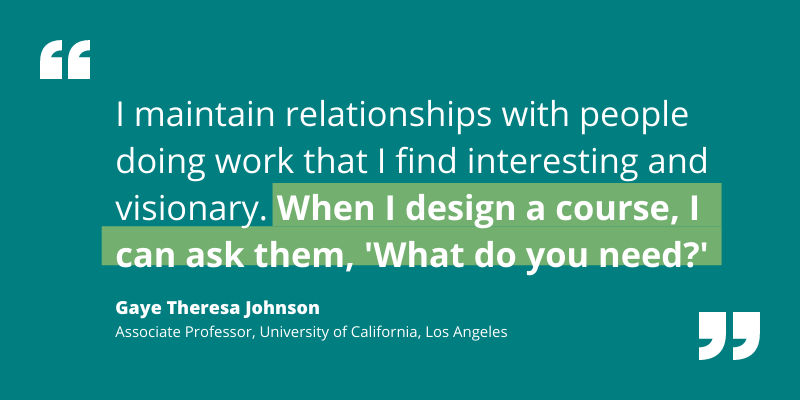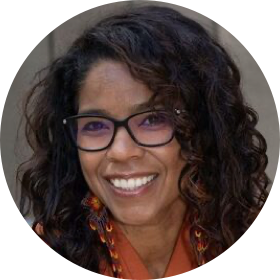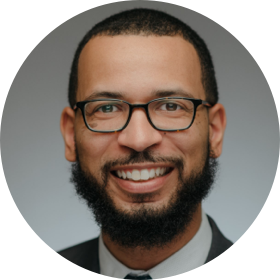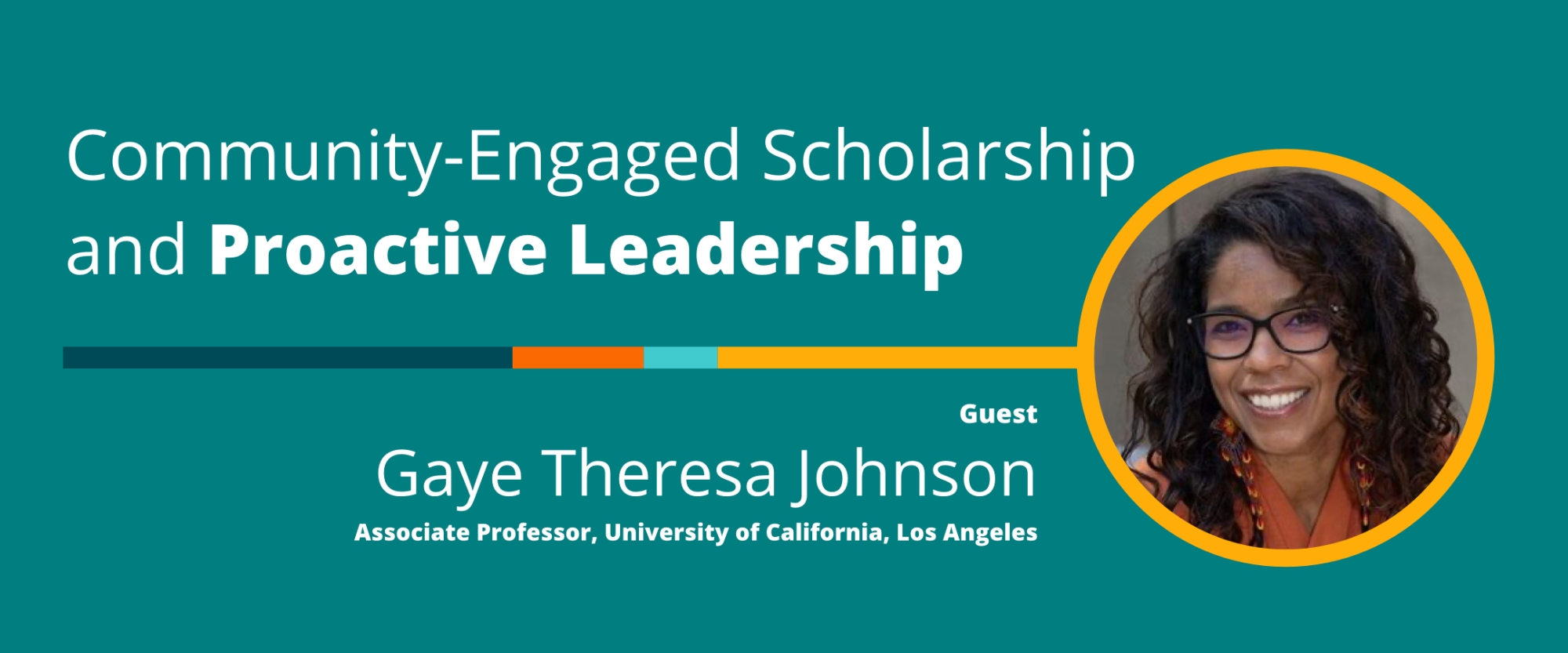Note: This interview in the Scholarship to Practice Series originally aired on March 25, 2021 as part of the University Innovation Alliance’s Innovating Together podcast, appearing live on Facebook, Twitter, and LinkedIn.
As Executive Director of the University Innovation Alliance (UIA), I'm proud to present the Innovating Together Podcast in collaboration with Inside Higher Ed. My co-host for Innovating Together's Scholarship to Practice series is Derrick Tillman-Kelly, Director of UIA's Fellows Program and Network Engagement. Scholarship to Practice surfaces relevant research on topics that administrators often wonder about – because in many cases, the answers are already out there. Our 3/25/21 episode was a conversation with Dr. Gaye Theresa Johnson, associate professor and core faculty member in the African American Studies Department at University of California, Los Angeles. Professor Johnson, who writes and teaches about race and racism, cultural history, spatial politics, and political economy, spoke with us about community-engaged scholarship. This area of study focuses on the sensitive interface between an institution of higher learning and the real-world, non-academic community that exists just outside the gate – and why proactive leadership is critical in how they engage.
What Is Community-Engaged Scholarship?
Professor Johnson calls herself a life-long learner in academic communities as well as those traditionally excluded from the academy. She explained, "I can't do this work without being part of conversations around some of the most pressing issues of our time, with the greatest humanity and understanding in community."
So what is a community-engaged scholar? "Institutions, especially elite institutions, were never designed to be in community with folks who have the greater public good in mind," she told us. "If that has occurred, it’s because students, community members, staff, folks who are clear about the role of education in society, pushed the institution to do that and held them accountable. For me, as an ethnic studies professor, it means to be aware of that history, to understand how we came into being, which was not because of some benevolent decision on the part of the institution. No. It was because of the movements of students and community members to establish these programs and a particular kind of presence on campus. And so to be community engaged is to always be in conversation with the people that make it possible for me to be there and for the students, the families, the movements that give us all meaning around our presence on the campus."
How to Engage With Communities
Professor Johnson described institutions' all-too-frequent engagement pattern with their communities. "It’s the ultimate conceit of educational institutions," she began, "and also corporations, philanthropic organizations, foundations, even grassroots organizations who presume that they know what’s best for communities when there’s been organizers doing it for 35 years. It’s like, 'Why don't you just ask them?' They have incredible platforms and plans and visions for the kind of society that we should all be living in, and very specific visions with roots back to how an institution should exist in a community."
Her pattern is different. "I maintain relationships with people in communities who are doing the kind of work that I find interesting and visionary," she said. "I try to be in conversation with those folks, enough that when I design a course that is community-engaged, I can go to the organizations who I’ve learned so much from over many, many years and ask them, 'What do you need?' It’s not about me asking the students, 'Hey, what do you think would be great for this community that you have never stepped foot in?' Let’s just be honest – you’ve never stepped foot on Skid Row in L.A. You’ve never been to Boyle Heights. As a person who identified as a man, you’ve never had to ask where you can get birth control. So let me ask the people who have been doing this work for decades what they need. And sometimes what they need really feels like a lot of ordinary work."

Professor Johnson shared an example of this ordinary work with Hunger Action L.A. "They had already created this 70-page guide that showed elderly folks where they could get food and other resources," she said, "but they needed it updated and translated into Spanish. And all of what I teach around that particular unit has to do with food insecurity, food deserts, how we treat our elderly folks, poverty, the structure of the city. And then they asked us halfway through the quarter, 'Do you think any of your students would want to lead low-vision seniors to the farmer’s market so that they could use food stamps or SNAP?' Because a lot of them don't know that they qualify for farmers’ markets with SNAP.
"Usually I have keywords that students are learning, not just keywords like capitalism or poverty, but also care, friendship, motherhood, all those things that make a society whole. When we’re part of institutions, we don't often think about the ways that this work that often seems ordinary is also about seeing humanity and participating in it in such a way that allows us to be in community. You can't presume, as a professor, to be community engaged if you aren’t already yourself community engaged. You can't teach it if you don't know it."
Spatial Entitlement and Representation
In Professor Johnson's book, she defines spatial entitlement as underrepresented groups' need to occupy, inhabit, and transform the physical places that they share. "If I was writing this book now," she admitted, "I would probably use a different term, but I think that it’s an important concept because we have to take spaces where we forge these brilliant possibilities, because these spaces are not assured or ever secure or stable when they’re given by the institution."
She observed that such well-meaning institutional gestures tend to be reactive rather than proactive: “What we’ve seen over the past few decades, especially with the advent of multiculturalism, has been an overrepresentation of people of color in brochures about our very white institutions. I’ve been on the website many times, and yet less than one percent of Black and Latinx professors are full professors across the nation. It has people believing that we are represented in a democratic way on campuses when that could not be further from the truth. So I think that the way that BIPOC folks establish their presence on campus is really beautiful and instructive for all of us because we – the staff, the faculty – we create community. Sometimes it could be such a joy to see folks congregating and having a great time in a professional environment. Sometimes it’s about speaking up when people are experiencing micro-aggressions or macro-aggressions, but it’s also about holding folks accountable around this issue of representation. If you’re going to use us to increase your revenue and profile around fairness, justice, and democracy, as if you’re always a participating institution in this project of racial equity, then the least you can do is create an environment that allows us to thrive and not have it be something we always have to struggle for."
The Beloved Community vs. Incarceration Culture
Community-engaged scholarship has enriched Professor Johnson's holistic view of social justice. "Beloved community is about being able to see visions of racial justice," she explained, "but also of all different kinds of interrelated success. In your beloved community, you should be able to regularly access the vision for change, but also the felt meaning of what it’s like to struggle for that and be in community together to ensure a kind of collective success that we all deserve."
For illustration, she described the antithesis: incarceration. "Incarceration is not just about how people are caged, but also how people are surveilled and the ways in which they are predisposed not only to incarceration and surveillance, but also to death – premature death we call it. The odds of you going to prison are greatly increased because of surveillance. Beloved community is in its best form antithetical to the idea that people need to be surveilled, that people cannot have the kinds of things they desire. People can have all the things they need to be whole and healthy. If they make a mistake or are born into a condition that they cannot help, they are not predisposed to being thrown away. That means that in beloved community, you have to engage in restorative and transformative justice processes. So there’s ways to address and redress things that come up in everyday human life.
"What does it mean to be in beloved community? It means that folks see, 'The problem here is not you. It’s the system that you were born into, it’s the condition that you’ve been exposed to.' The beloved community says, 'How can we work together to restore the conditions that are going to make it possible for you not only to succeed, but to be whole? And when someone or a group of people wrongs you, how can we engage in the dialogue so that all of us can learn together?'"
A Starting Point for Proactive Leadership
For institutional leaders who want to engage in community scholarship, Professor Johnson recommends starting from a place of sincerity, "which is to say, 'We're trying to address a real blind spot. We’re in our own accountability process, but we realize that we need to be in conversation with you. We don't want to dictate the terms of the conversation. We really are trying to step out of the history of the transactional relationship that we’ve had as leaders with our community. We really want to put a new foot forward. We want this to be ongoing. Here’s what we can do right now. We have this money. We’d like to use it by June 1, and so we’d love to hear your ideas for this.'
"Everyone is thirsty for real, intentional openness and integrity," Professor Johnson stated. "I think leaders are often in those positions because they can demonstrate that. We just need to start for that place that allows us to proceed with that spirit."
Links Mentioned in This Episode
• University of California, Los Angeles
• Hunger Action L.A. (a food justice nonprofit serving Los Angeles residents)
• SNAP (Supplemental Nutrition Assistance Program, administered by the U.S. Department of Agriculture)
• Professor Johnson's book (Spaces of Conflict, Sounds of Solidarity: Music, Race & Spatial Entitlement in Los Angeles by Gaye Theresa Johnson)
• BIPOC (acronym for Black, Indigenous, and people of color as explored by Constance Grady in Vox, 6/30/20)
• Restorative and transformative justice (a Centre for Justice & Reconciliation summary and discussion of these two practices)
Keeping Up With Dr. Gaye Theresa Johnson
Dr. Johnson is on Twitter as @LaDoctoraGTJ and available by email at gayetheresaj@chavez.ucla.edu.
Bios of Guest Luminary and Co-Hosts

Guest Luminary: Gaye Theresa Johnson, Associate Professor, University of California, Los Angeles
Gaye Theresa Johnson, an associate professor and core faculty member in UCLA's African American Studies Department, writes and teaches on race and racism, cultural history, spatial politics, and political economy. Her first book, Spaces of Conflict, Sounds of Solidarity: Music, Race, and Spatial Entitlement in Los Angeles, was published in 2013. Her current work includes The Futures of Black Radicalism, co-edited with Alex Lubin, and These Walls Will Fall: Protest at the Intersection of Immigrant Detention and Mass Incarceration. Dr. Johnson has also contributed journal articles and book chapters to historical, cultural studies, and ethnic studies volumes. She has been a visiting researcher at Stanford University’s Center for the Comparative Study of Race and Ethnicity, and at the African Leadership Academy in Johannesburg, South Africa. She is active with the Los Angeles Community Action Network’s struggle for housing and civil rights on L.A.’s skid row, for which she earned the 2013 Freedom Now! Award. Dr. Johnson serves on the board of directors for the Central Coast Alliance United for a Sustainable Economy (CAUSE) and on the advisory board for the Rosenberg Fund for Children.

Co-Host: Bridget Burns, Executive Director, University Innovation Alliance
Dr. Bridget Burns is the founding Executive Director of the University Innovation Alliance (UIA). For the past decade, she has advised university presidents, system chancellors, and state and federal policy leaders on strategies to expand access to higher education, address costs, and promote completion for students of all backgrounds. The UIA was developed during Bridget’s tenure as an American Council on Education (ACE) Fellowship at Arizona State University. She held multiple roles within the Oregon University System, including serving as Chief of Staff and Senior Policy Advisor, where she won the national award for innovation in higher education government relations. She was a National Associate for the National Center for Public Policy and Higher Education, and has served on several statewide governing boards including ones governing higher education institutions, financial aid policy, and policy areas impacting children and families.

Co-Host: Derrick Tillman-Kelly, Director, University Innovation Alliance Fellows Program and Network Engagement
Dr. Derrick L. Tillman-Kelly serves as the Director of the UIA Fellows Program and Network Engagement for the University Innovation Alliance. He previously served in multiple roles at The Ohio State University, including as the inaugural UIA Fellow and special assistant to the director of the Center for Higher Education Enterprise. Dr. Tillman-Kelly earned his Ph.D. in educational policy and leadership with a specialization in higher education and student affairs from Ohio State; a master’s degree in higher education and student affairs from Indiana University; and a bachelor’s degree from Illinois Wesleyan University.
About Scholarship to Practice
Scholarship to Practice is an event series that happens live on Facebook, Twitter, and LinkedIn. It also becomes a podcast episode. We interview higher education scholars, researchers, and academics that distill how a practitioner or administrator could apply learning in real-time to improve student success. At the UIA, we know that we need to bridge that gap between scholarship and practice if we’re going to stand a chance of improving student success. We all need to work together leveraging research in the field and identifying where we need more research to support greater innovation in higher ed. With its short and conversational format, this show is designed to help bridge that gap by elevating the relevant research we all could be using in our daily lives.
Rate, Review & Subscribe
Learn why hundreds of people have rated this new podcast 5 stars! Please join others and rate and review this podcast. This helps us reach and inform more people -- like you -- to help increase the number and diversity of college graduates in the United States.
Click here, scroll to the bottom, tap to rate with five stars, and select “Write a Review.” Then be sure to let us know what you loved most about the episode! Also, if you haven’t done so already, subscribe to the podcast. We’ll be adding a bunch of bonus episodes to the feed and, if you’re not subscribed, there’s a good chance you’ll miss out.

